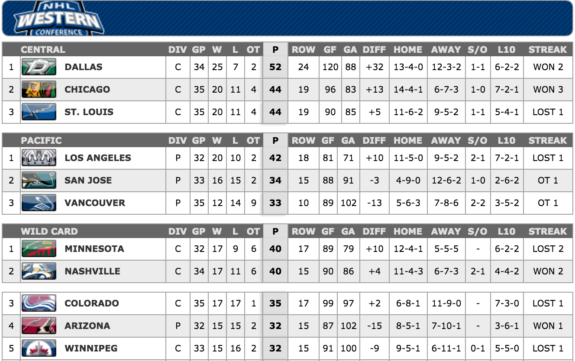The NHL’s new seeding system has been criticized previously, but it seemed that parity in the league would render the problems relatively minimal. And that has been true, so far. No team has missed the playoffs while collecting more standings points than a team who made the playoffs.
However, the somewhat unexpected weakness of the Pacific Division is going to bring those problems to a crescendo come April in a couple different ways.
The problem and why it didn’t matter
We saw the flaw to some extent last year. The Central Division was the powerhouse, claiming five of eight playoff spots, the maximum available to teams in any single conference.
The Anaheim Ducks ran away with the Division and took the Conference regular season title. That means they play the bottom of the two wild card seeds. They drew the Winnipeg Jets.
Both of the wild card teams from the Central — the Jets and the Minnesota Wild — finished with more points than the Calgary Flames, who finished third in the Pacific. An acceptable oddity of the current seeding system. Both teams made the playoffs and the Flames had more points than the Dallas Stars, who had the most points of any Western Conference team not in the postseason.
For the Ducks, this meant that taking first place didn’t actually earn them the right to play the worst team coming out of the Western Conference. Arguably you would have rather faced either the Vancouver Canucks or the Flames over the two wild card teams in the Central.
But the Ducks won their series.
So this didn’t wind up being a problem. Or at least there wasn’t public griping.
Problems with the system were seen, but two things would have to happen for there to be any public complaints inside the NHL. A team would have to miss the postseason while having more points than a team who makes it. Or a top-seeded team would have to lose their first round match to a team who was head and shoulders above the third place finisher in the weaker division.
This Year
This year, the Western Conference is on pace for both of those things to happen. The Kings are running away with the Pacific Division, carrying eight more points than the second place San Jose Sharks.
With how things stand right now, that’s bad news for the Kings.

Entering Tuesday’s games six teams in the Central have enough points to be in the top three in the Pacific despite playing in a more challenging division. In fact, the only team from the Central who wouldn’t are the Jets, and they’re just one point back from the third place Canucks and have two games in hand.
For their troubles, the Kings would draw the Minnesota Wild, if the playoffs started right now. Meanwhile, the Sharks would play the Canucks.
The Sharks and Canucks are the only two teams in either conference who are inside the playoff picture but have a negative goal differential. With a win on Tuesday, the Canucks move just one win up from fewest in the NHL and the Sharks, next to the Canucks, have the fewest wins of any team inside the playoffs in either conference.
So the Sharks and their 4-9-0 home record draw the team who is allowing the most goals per game of any playoff team in the West, who has won the fewest games in the NHL, has the worst score-adjusted Corsi For percentage of a Western playoff team, has a 23rd ranked power play and the 22nd ranked penalty kill.
Here’s a statistical breakdown of all the Western Conference playoff teams as of Tuesday, December 22.
| Goal Differential | GF/GP | GA/GP | CF% | |
|---|---|---|---|---|
| Dallas Stars | +32 | 3.50 | 2.56 | 53.70% |
| Los Angeles Kings | +10 | 2.47 | 2.19 | 56.50% |
| Chicago Blackhawks | +13 | 2.71 | 2.37 | 52% |
| St. Louis Blues | +5 | 2.54 | 2.40 | 53.30% |
| San Jose Sharks | -3 | 2.64 | 2.76 | 49.70% |
| Vancouver Canucks | -13 | 2.49 | 2.86 | 48.40% |
| Minnesota Wild | +10 | 2.78 | 2.47 | 49.80% |
| Nashville Predators | +4 | 2.59 | 2.50 | 54.40% |
The Wild aren’t the most feared team in the West by any stretch, but if you get to pick the team you’re facing, you’re probably picking the Canucks 100 times out of 100. They aren’t a playoff team. But here they are, a playoff team and the top two teams in the West will draw the Wild and Predators while another team who is marginally a playoff team draws the Canucks.
It’s a tough situation for the Kings and a first round out at the hands of the Wild in this scenario would be a frustrating outcome for fans and one team’s front office. (Not to mention the Avalanche fans who are golfing early when they had more points than a team who is in the playoffs and drew the second worst team in the first round.)
The adage that you have to be able to beat everyone to get to the Stanley Cup is true. If you can’t beat the Wild in the first round, what makes you think you’ll beat the team you’d meet in the second round? Nonetheless, the seeding system exists for a purpose and every team will gladly take an easier match to start the postseason. This seeding system is broken and we’re on track for it to create a frustrating postseason in the Western Conference.